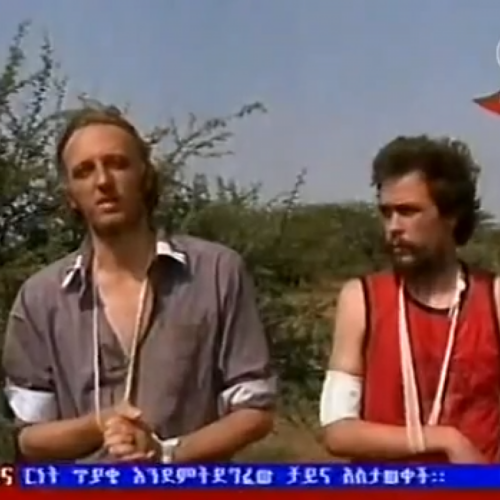Introduction
In a crowded courtroom in Addis Ababa, Ethiopia, a trial started Tuesday for two Swedish journalists facing terrorism charges.
Photojournalist Johan Persson and reporter Martin Schibbye, freelancers working with Swedish publications, were arrested by Ethiopian security forces on July 1. They were investigating allegations of ongoing human rights abuses in the Ogaden region — a remote stretch of the Horn of Africa, where Ethiopian forces have clashed with the Ogaden National Liberation Front. The journalists entered Ethiopia from Somalia without visas, traveling with rebel soldiers. They were detained after a firefight.
The arrest of the pair set of protests by Swedish journalists, some of whom have since taken turns locking themselves to light poles and gates in front of Kronoberg Prison in Stockholm.
“These journalists should not be detained for seeking to cover an under-reported story,” said Tom Rhodes of the New York-based Committee to Protect Journalists (CPJ) in a statement.
CPJ and other international journalism groups have urged Ethiopian authorities to release the pair. Norway’s Prime Minister Jens Stoltenberg raised the matter during a recent meeting with his Ethiopian counterpart Meles Zenawi.
Swedish journalists also have pressed the nation’s politicians for action. They’ve complained that Foreign Minister Carl Bildt has not done enough and suggested this is because Persson and Schibbye were said to be looking into allegations that Ethiopian troops were protecting personnel from Lundin Petroleum, among the foreign oil companies with exploration contracts in Ogaden. Bildt once served as a board member of Lundin Petroleum.
Bildt and other Swedish officials quickly rejected the accusation and Bildt dispatched a representative to Addis Ababa to monitor the trial.
“These journalists were only trying to do their job, reporting on a conflict which is not well understood outside the region,” said Arne Konig, president of the European Federation of Journalists. “It is the duty of journalists to provide independent and impartial information which requires access to the location.”
Persson and Schibbye have admitted they entered without visas, but deny the terrorism allegations.
Against the journalists the Ethiopian government has applied a new anti-terrorism law that — according to government critics who’ve translated the text — can snare anyone who “writes, edits, prints, publishes, publicizes, disseminates, shows, makes to be heard any promotional statements encouraging, supporting or advancing terrorist acts.” A recent analysis by Human Rights Watch said Ethiopia’s terror law is a tool for squelching government critics.
According to CPJ, 79 Ethiopian journalists have fled the country over the last decade after government harassment. And since 2006, the government has detained or expelled journalists representing the Associated Press, the New York Times, Bloomberg News, the Christian Science Monitor, the Voice of America (VOA) and the Washington Post.
Last month Ethiopian officials presented a video as evidence supporting terrorism charges against the Swedish journalists. The footage shows a photo of Persson holding an assault rifle. But Swedish supporters of the accused journalists said the video was doctored and that the weapon Persson is holding belonged to a security guard at a hotel in Somalia, where the picture was taken.
After first refusing requests for visas by several Swedish outlets, Ethiopian authorities allowed 18 Swedish journalists to attend opening day of the trial. In a web post on Tuesday, the VOA said several foreign diplomats also attended the session. There is no word on how long the trial might last, but the VOA correspondent in Addis Ababa wrote that local legal analysts expect a quick resolution.
Read more in Accountability
Accountability
FACT CHECK: Will health care law raise insurance premiums?
Republicans exaggerate an increase caused by the new law, but Obama promised lower premiums

Join the conversation
Show Comments